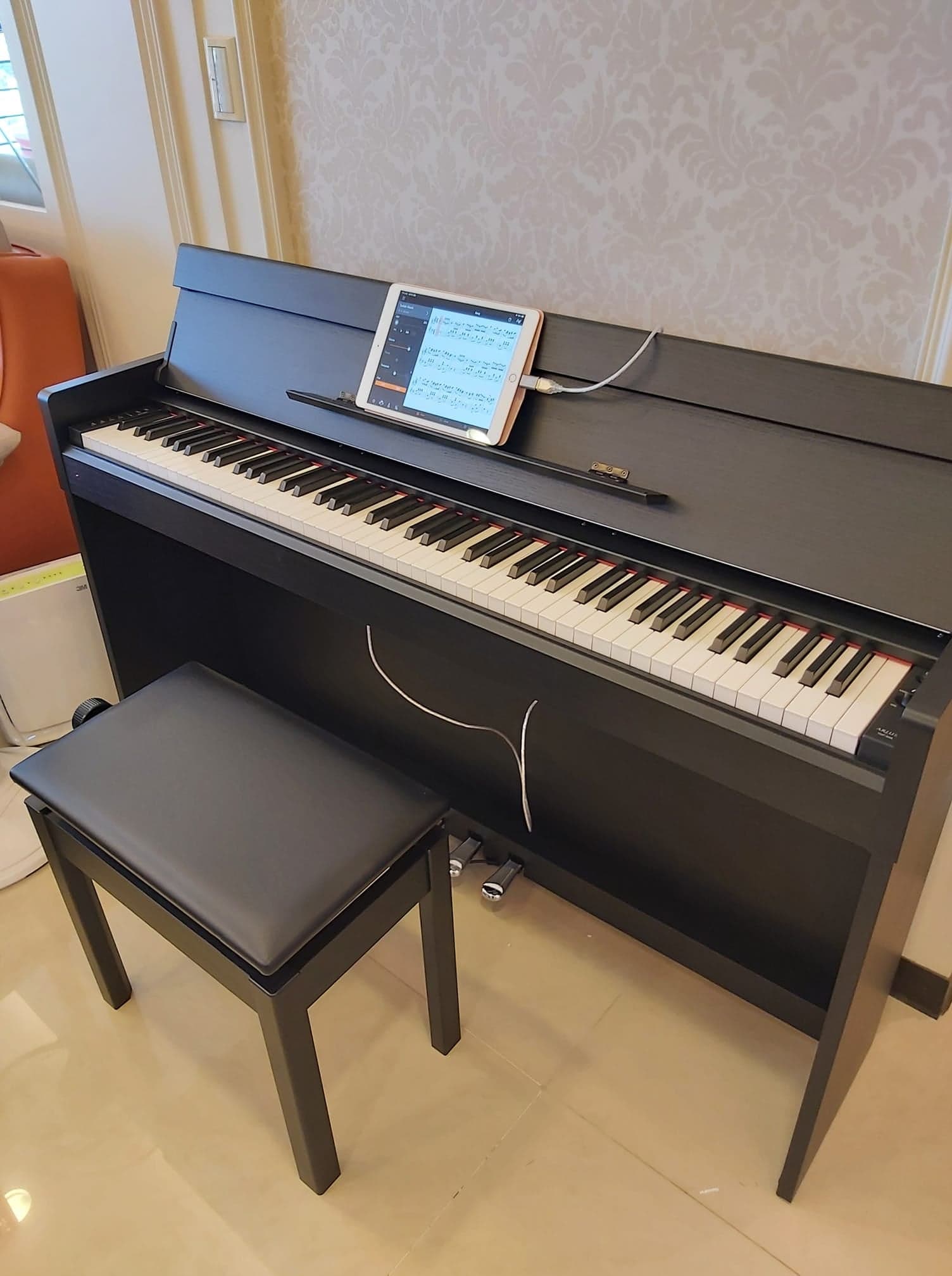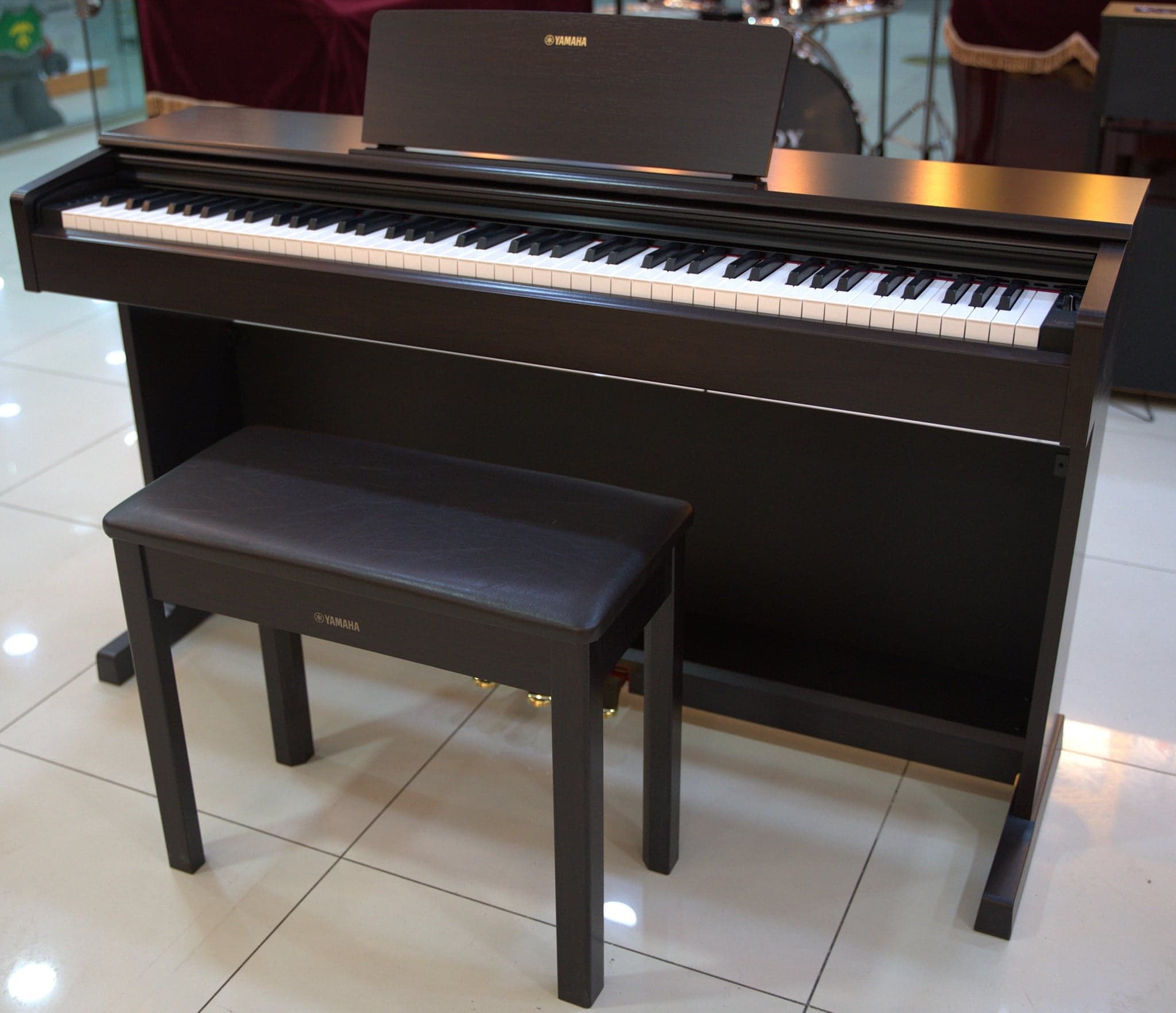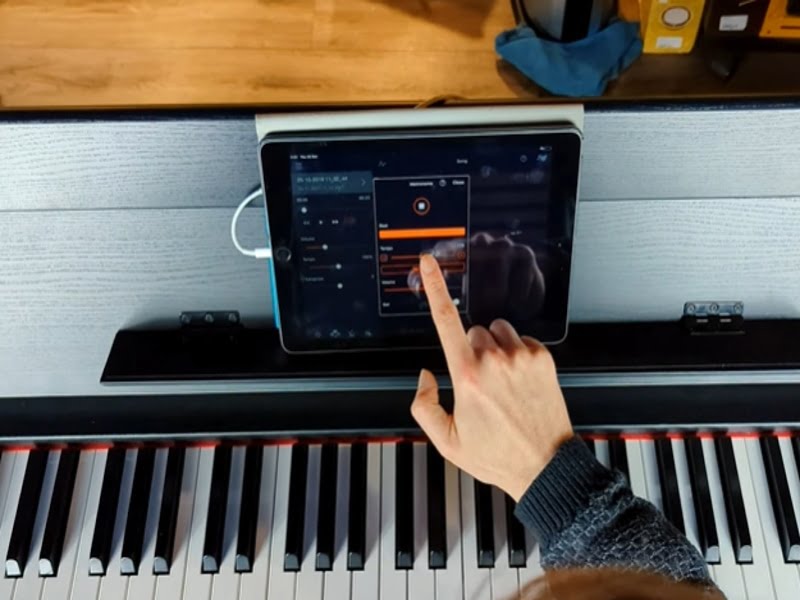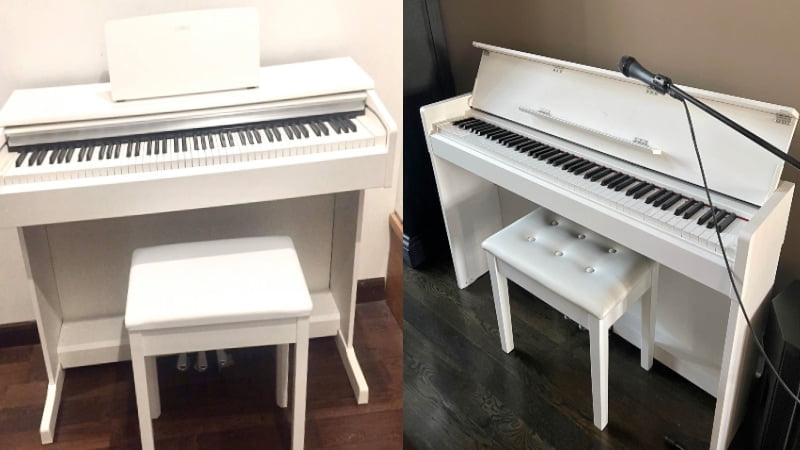Both from the Arius series, there are very few points of comparison in the Yamaha YDP144 vs S34 match up. The choice ultimately boils down to personal preference.
The Arius series (also known as the YDP) from Yamaha is a favorite among novice and intermediate-level pianists mainly because of its great functionality and amazing affordability. Two of the most sought-after in this line are the YDP144 and the S34.
The distinction is quite obvious at first glance: the former is bulkier and more traditional-looking just like an upright piano, while the latter is sleeker, boasting a more modern flair. But truth be told, there is almost nothing that differentiates the two when it comes to the sound or feel, especially when you take a peek under the hood.
It’s hard to say which is the better pick in the Yamaha YDP144 vs S34 head-to-head because of their shared traits. I personally like the more compact feel of the latter, but do check out the specifics listed down below and maybe you can choose which you would favor.
Yamaha YDP144 vs S34: Comparison Chart




Last update on 2025-07-06 / Affiliate links / Images from Amazon Product Advertising API
Yamaha YDP144 vs S34: Head to Head Comparison
There is very little to complain about Yamaha’s handiwork. Whether you’re a beginner or a well-trained pianist, you can pick out any digital or acoustic piano in their arsenal that suits your needs and be satisfied or impressed.
That is definitely what you can expect from any of the models from the Arius or YDP series – the more affordable version of the much-loved Clavinova. If you’re looking for an upgrade but are on a budget, any of the six digital pianos in the Arius line would be an excellent option. But let’s focus on the Yamaha YDP 144 vs S34.
As mentioned earlier, the two are fundamentally similar, from the sound engine and hammer action to the individual effects and playing modes. The main difference between these equally wonderful pieces is the facade.
The YDP144 is wider (in depth), with a slanted top cover. Many complain that nothing can be placed on top of it because it would slide off. It also has the traditional upright piano appearance, great for those who prefer a more old-world style. The S34, on the other hand, is sleeker and more modern. The flat cover can be used as a top surface for anything – framed photos, notebooks, and other items. But more importantly, the simpler lines would fit any room aesthetic.
It may not matter to some but I find that it does to me, hence my crowning of the Yamaha YDP S34 as the victor. It is quite unfortunate that it is currently discontinued in the brand’s website. Now, if the same goes for you, read on because I will be describing all these in detail.
Feel and Playability
The Winner: Tie
Both the Yamaha YDP144 and the S34 are equipped with 88 textured plastic keys supported underneath by the GHS or Graded Hammer Standard, a satisfactory system that mimics the feel of an acoustic piano.
I did wish that these two were outfitted with the more advanced GH3 key action, especially considering the two are over a thousand dollars each. But all in all, both are still good pieces for those looking for an upgrade.
As it has been summed perfectly well in the chart provided, the two are equally matched in this regard.

+Hammer Action
The Graded Hammer Standard essentially means that all 88 keys of the YDP144 and the S34 are fully weighted, with the left-most side of the digital piano having a heavier pull than the right-most side. Again, this is meant to emulate the realistic feel of the real deal – an acoustic grand.
To be honest, it’s not much of a step-up from their entry-level P-series pieces but if you used to own non-weighted keyboards, playing either of the two would be a treat.
+Touch Sensitivity
This feature is very much needed in high-quality digital pianos, particularly those aimed at intermediate-level players because this mimics the intensity of the sound on an acoustic depending on how hard it was hit.
Like all Yamaha digital pianos, even the low-cost ones, the YDP144 and S34 comes with four pre-set touch sensitivity options: soft, medium, hard, and off.
+Key Texture
If I had a main beef with the most models in the Arius series, it would have to be this particular facet. For its price range, the YDP144 or S34 should have something better than plastic keys. Sure, they’re textured so your fingers won’t slip when you’re playing but Yamaha could have done so much better, in my opinion.
Tone
The Winner: Tie
In the same fashion as the chapter above, Yamaha YDP144 and the S34 have the very same features in this particular aspect. But while I am slightly underwhelmed by the feel and playability component, I am quite impressed by the sound engine used for the two.
+Tone Generator
Most of the digital pianos in the Arius series are actually upgrades (YDP143 to YDP144, YDP 163 to YDP164, and so on…) and the improvements they have made were focused on the tone generation.
The older variant used to have the Pure CF sound engine, but it was bested by some of its competitors like Roland’s SuperNATURAL sampling system. Now, the Arius is equipped with Yamaha’s jewel, the CFX concert grand. This is such a treat because only the pricier Clavinovas had this sound engine in the past.

+Sound Library
The YDP144 and S34 have the same specs in this section. Each has 10 voices (3 acoustic pianos, jazz organ, and DX electric piano, to name a few), 10 voice demos, and 50 preset songs.
Piano Functions and Features
The Winner: Tie
Despite the risk of sounding repetitive, it would have to be said in this section as well: there is no difference between the YDP144 and the S34 when it comes to their specific functions and features as well.
+Polyphony
If you’re on a hunt for an upgrade and you are used to digital pianos with polyphonies of less than a hundred, both the YDP144 and the S34 with 194 would sound incredibly wonderful to you. Flex your fingers and get ready practicing your Chopin and Brahms pieces, whichever of the two you decide to get.
+Playing Modes
There are three specific playing modes that most musicians look for in digital pianos: Layering (capability to play two instruments at the same time), Split (bisecting the 88 keys into two sections and allowing the digital piano to play two instruments, and Twin (bisecting the 88 keys into two sections with the same voice and keys).
The two models presented here have Layering and Twin mode. Personally, the mode left out is not as desired as the other two so it wouldn’t be missed by many. It is good that the Twin function is still included. Beginners would agree because they might want to practice side by side with their tutors.

+Effects
These additional features are must-haves in digital pianos so that musicians can get the feel of how it would sound in certain scenarios. The YDP144 and the S34 are equipped with 4 different kinds of reverb, string and damper resonance, stereophonic optimizer, and Intelligent Acoustic Control, among others.
+Recording Capability
The two Yamahas can record one song and two tracks, with each having up to 100KB or approximately 11,000 notes.
+Connectivity
The YDP144 and S34 aren’t the most technologically advanced with just the standard stereo phone jacks and USB to host connectivities. But to be fair, state-of-the-art tech isn’t something expected of the Arius series. By the mere looks of it, these are meant to be played in the comforts of the home.
+Speaker System
If there is another thing which really disappointed me about the YDP144 and the S34, it’s the amplification. With only two 12cm x 6cm speakers and two 8W amplifiers, the two can really just be enjoyed in small spaces for recreational playing and practice.
+Accessories
The unit comes with a three-pedal system and the cabinet it is housed in. Some stores throw in a matching bench but don’t always expect that to be a freebie.
Yamaha YDP144 vs S34: The Similarities
As reiterated numerous times in this article, it would be very hard to choose a clear winner in the Yamaha YDP144 vs S34 competition because the two are practically the same. Even the pre-recorded songs are similar. If you simply browsed through the detailed descriptions above, this would be very apparent in the outline of the pros and cons of each model below.
Quick Rundown of the Yamaha YDP144
- Your purchase includes One Yamaha Arius Series, YDP144 model | Bench, 50 Classical Music Masterpieces Book, Owner’s manual & Quick Operation Guide
- Piano dimensions – 53-7/16” W x 32-1/16” H x 16-5/8” | Weight – 83 lbs. | Number of pedals – 3 | Max polyphony – 192 | Number of voices – 10 | Headphones – (2) Standard Stereo phone jack | With Recording and Playback capabilities
- GHS weighted action is heavier in the low keys and lighter in the high keys, just like an acoustic piano
- Half-damper pedal control allows for continuously increasing amounts of sustain as the pedal is depressed
- The CFX Premium Grand Piano Voice recreates the power and tone of the flagship CFX concert grand piano from Yamaha
Last update on 2025-07-06 / Affiliate links / Images from Amazon Product Advertising API
Quick Rundown of the Yamaha YDP S34
- The Arius YDP-S34 digital piano helps you express that creativity through a stylish, compact design that brings elegance to any room
- Features the sound of the flagship Yamaha CFX concert grand piano, and renowned GHS keyboard action, bringing the most important elements of a piano together - touch and tone
- GHS weighted action is heavier in the low keys and lighter in the high keys, just like an acoustic piano
- String Resonance recreates the sympathetic sounds of other strings resonating, just like the behavior of acoustic pianos.
- Acoustic Optimizer physically adjusts the acoustic flow by using a special design and position within the instrument to control resonance and enrich the overall sound.
Last update on 2025-07-06 / Affiliate links / Images from Amazon Product Advertising API
Product Video
References:
- Yamaha YDP144: https://usa.yamaha.com/products/musical_instruments/pianos/arius/ydp-144/specs.html#product-tabs
- Yamaha YDP S34: https://usa.yamaha.com/products/musical_instruments/pianos/arius/ydp-s34/specs.html#product-tabs
Related Articles to Yamaha Ydp 144
- Yamaha YDP144 vs YDP-144R: What’s the Difference?
- Yamaha YDP-144 vs YDP-S54: What’s the Difference?
- Yamaha YDP-144 vs 184: Which Is the Best Arius Model for the Money?
- Yamaha YDP-144 vs YDP-181: Is the YDP-144 a Worthy Upgrade?
- Yamaha YDP-144 vs Roland F-140R: Which Digital Piano Do You Need?
- Yamaha YDP-144 vs Kawai KDP-120: Which Piano Is the Best?
- Yamaha YDP-144 vs Kawai KDP-110: Why the YDP-144 Is the Better Piano
- Yamaha YDP-144 vs 164: Which Is the Better Arius Piano?
- Yamaha DGX-660 vs YDP-144: Which Is the Better Yamaha Piano?
- Yamaha DGX-670 vs YDP 144: Finding the Best Digital Piano
- Yamaha YDP144 vs 163: Which Is The Best Arius?
- Yamaha YDP-143 Vs 144: Is The YDP-144 A Worthy Upgrade?
- Yamaha YDP-103 Vs 144: A Battle Of Two Arius Models
- Casio PX-870 Vs Yamaha YDP-144: Which Is The Better Console Digital Piano?
- Casio PX-770 vs Yamaha YDP-144: Which Is The Better Digital Piano?
Related Articles to Yamaha Ydp S34
- Yamaha P125 vs YDP S34 Comparison: Does the Portable P125 Hold Up Against a Console Digital Piano?
- Yamaha YDP-103 Vs S34: Which Arius Model Is The Better Pick?
Lulacruza is an electronic folk duo operating at the junction of the hypermodern and the ancient. Our music weaves together hypnotic female singing, South American folk instruments and electronic processing, while channeling pulsating waves from the source of creation.
Lalucruza is also a community where you can connect with other music lovers to collaborate, exchange ideas and share knowledge. A platform for who wants to learns the basics of playing piano, guitar, drum masters’ technique, etc.. is the premise of our website.
